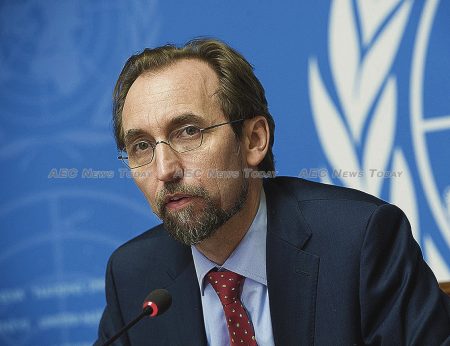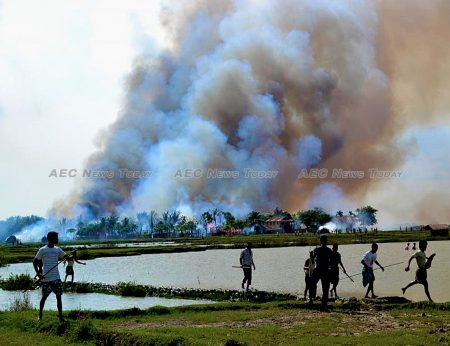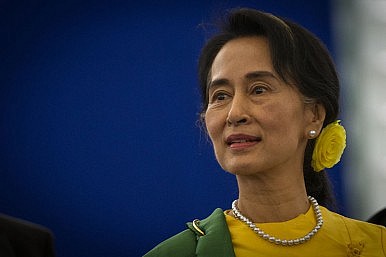The life of a politician is made infinitely easier when, as the saying goes, their actions are judged by their reputation, and not the other way around. Such a phrase is befitting of Myanmar's de facto leader Aung San Suu Kyi, whom the media can describe with a number of glowing phrases: Nobel prize laureate, democracy icon, human rights defender, champion of the Myanmar people.
However, Keith Harper, who served as former U.S. President Barack Obama's ambassador to the UN Human Rights Council, had these words to say about her on Monday:
Unfortunately, what has become increasingly clear over the ensuing months, is that while Daw Suu Kyi was perfectly comfortable reaping benefits as a human rights icon for her own pro-democracy struggle, she is not prepared to display the political courage necessary to take a stand for an unpopular Muslim minority group and prevent the grave and systematic denial of their human rights.
Enjoying this article? Click here to subscribe for full access. Just $5 a month.
A few more choice extracts from the statement include:
For far too many, her iconic status as pro-democracy crusader makes it difficult to hold accountable a Suu Kyi-led government no matter the well-documented human rights violations…
Her Nobel Prize has become a most awful kind of shield from proper scrutiny…
Even accepting that Suu Kyi does not sufficiently control the military, she has utterly failed to utilize her considerable bully pulpit which would undoubtedly be impactful.
The phrase"scathing attack" might have been apt to describe this statement if it wasn't for the clarity and logic of its argument. But when one criticizes Suu Kyi there is the sneaking suspicion that you will be palmed off as just an iconoclast or, perhaps worse, unfair. I can already hear the thoughts of her apologists: "Leave her alone, she's trying her best. Look at what she's up against."
Very well. She is up against a military (Tatmadaw) that still automatically controls a quarter of seats in the parliament and three key ministries and has proven to be largely independent of the NLD government. And then there is a resurgent movement of chauvinist Buddhists, openly calling for the persecution of the Rohingya and finding a good deal support among the general public.
But Suu Kyi has known what she is up against for decades (these are hardly new developments) and, even under the perilous situation of house arrest, was happy to deride her opponents for what they were: dictators and murderers and oppressors of the people of Myanmar.
Yet, we are to believe that it is perfectly defensible, now she has achieved a position of power, that her once famed audacity to stand up to the forces of the Tatmadaw and chauvinists in society has become conspicuously quiet. A recent article in the Harvard Political Review intoned an odd mixture of feebleness and sophistry:
While Suu Kyi deserves some of the criticism for her failure to effectively deal with the violence against the Rohingya, her silence does not stem from a naive hatred of the group, but from a careful standoff between her, Myanmar's military forces, and Buddhist nationalists.
Of course she doesn't hate the Rohingya. Few sensible people claim as much. And the use of the word "careful" appears odd, since in this reading the NLD is in the most perilous position. Nevertheless, the intent of this opinion has become something of an orthodox view of many commentators, warranting two questions.
First, isn't it an indication of opportunism and cynicism, not careful or sensible politics, to negate one's principles when in a position of power? Indeed, how else can one look at the situation other than that Suu Kyi possessed greater courage to stand up to the military junta and its civilian frontmen when under house arrest (with no power) than she does now as the de facto leader of an elected government, with a number of ministries to her name and the freedom to travel the world as an elected official (with the apparent ability to raise awareness of the issue and cash through the goodwill she is owed by some international statesman).
In a 1989 essay, Suu Kyi wrote that "it is undeniably easier to ignore the hardships of those who are too weak to demand their rights than to respond sensitively to their needs." How the prophetic becomes the pathetic.
Moreover, and this is important: she has not been "silent" on the persecution of Rohingya as some people like to say. Instead she called the accusations of human rights violations "fabrications." This is not avoiding the issue; it's taking the side of the perpetrator.
Let us, for a moment, quickly look at what Suu Kyi believes to be fabrications. Here is just one story of many documented in a February report by the UNCHR on the Rohingya refugees in Bangladesh, which also stated that as many as 66,000 Rohingya have fled to Bangladesh since October escape what has been called "human rights violations." This is told by an 11-year-old girl:
The next time the military came, there were eight to 10 of them, they were asking where my father and sisters were. They were also saying that they were searching for people from Bangladesh. They removed all my clothes and all my mother's clothes and kicked us with their boots. Then they left. I do not know why. But the next day they came again. This time there were seven of them. They dragged my mother outside the house and locked themselves in the room with me. I do not know if they all abused me, I lost consciousness at some point. My mother woke me up with water. I was bleeding a lot.
In 2011 Suu Kyi was lauded by then-Secretary of State Hillary Clinton when the pair met for the first time. During this address at the meeting, Clinton spoke warmly about the famed speech Suu Kyi delivered at a UN conference in Beijing in 1995 on women's rights.
During that speech Suu Kyi oscillated between the blatantly false and the blatantly obvious, but it had a powerful effect anyway. "To the best of my knowledge," she said, "no war was ever started by women. But it is women and children who have always suffered most in situations of conflict."
Two decades on, all Suu Kyi had to say on a conflict in which girls as young as 11 were gang-raped by the military personnel of the country she represents was that the claims were "fabrications." As for no woman starting a war, she might have overlooked other cases such as the fact that Queen Victoria was on the throne during the Second and Third Anglo-Burmese War. (Or was Victoria as "passive" in these wars as Suu Kyi is in Myanmar's persecution of the Rohingya? Hardly). Nevertheless, it is clear that Suu Kyi hasn't also done much to end the current war on the Rohingya, only fanned some of the flames.
Now, returning to the orthodox view, the second line of argument is that her supposed reticence to speak out about the violations against the Rohingya and the actions of Buddhist chauvinists is a calculated decision, somehow reasoned to be for the greater good. She is gradually building a democratic society and does not want to anger the Tatmadaw, sparking a possible coup against the NLD, so the argument goes.
If this reason is to be accepted, then it is clear Suu Kyi has placed politics and pragmatism above any ideals. Fair enough, but then one should see her for what she has become, a mere mortal politician, not the icon she is still thought of as (the Asian Nelson Mandela shown in the likes of Luc Besson's The Lady).
Moreover, if it is some calculated decision, she had better show some results soon. At the moment, the social change the electorate thought it was voting for is happening at snail's pace, if at all.
The NLD ran its 2015 campaign on the slogan, "Time for Change." "Vote for us, just look to the party flag," Suu Kyi told a crowd in August that year. "It's time for change, let's vote for NLD and have real change!"
Instead of the change, the NLD government has cracked down on free speech, allegedly formed close ties with "crony capitalists," and seenhundreds of NLD activists quit, claiming the party's leaders have become too authoritarian. It has failed utterly to deal with demands of the various ethnic groups and the economy has hardly surged as predicted. Moreover, the whole saga of Suu Kyi not being able to become president left a bad taste in the mouth.
Today, NLD members and Suu Kyi seldom speak to the media, one might guess because they will be asked difficult questions they don't want to answer. It even took her a month to make a public comment on the murder of prominent Muslim lawyer and activist U Ko Ni, an old comrade and friend.
Of course, some reforms have taken place. But they are nothing like the ones promised. On the issue of change, Suu Kyi has offered only excuses. She said last month: "Our citizens who have been struggling hard for many decades may think it's a very long time. But for the history of a country, for the history of a government, 10 months or one year is not much. This is just a short period."
Wasn't this the same line of the ancien regime (give us more time to reform and change)? And where is the sense of urgency that motivated the NLD before their victory? Some apologists have tried the line that expectations were simply too high after the NLD won in 2015, consciously turning the blame on the electorate, not the NLD. I have even seen in print the suggestion that Suu Kyi's fawning over the military is, perhaps,akin to Stockholm syndrome (which is either hyperbole or an admission that she is unfit to lead).
One conclusion, drawn by Kirsten McConnachie of the University of Warwick, writing in The Conversation in February, is that "the new government looks much like the old regime." Another is that the whole saga speaks not of patient or clever politics (however unsavory that would be given the context) but of a government and a leader completely out of their depth. Maybe rumors of declining health also factor into this.
Towards the end of F. Scott Fitzgerald's The Great Gatsby, the character of Nick Carraway comments that "the loneliest moment in someone's life is when they are watching their whole world fall apart, and all they can do is stare blankly." There is a stirring emotion to feel some sympathy for Suu Kyi; she has fought for decades and sacrificed a great deal (more than most would forego) to get to where she is.
But such sympathy quickly fades when one considers that it is the people of Myanmar who have truly suffered, and that these are the same people being let down by the person who promised them genuine change and has, so far, failed to deliver. Then again, another emotion stirs: I desire nothing more than to be proven wrong.









